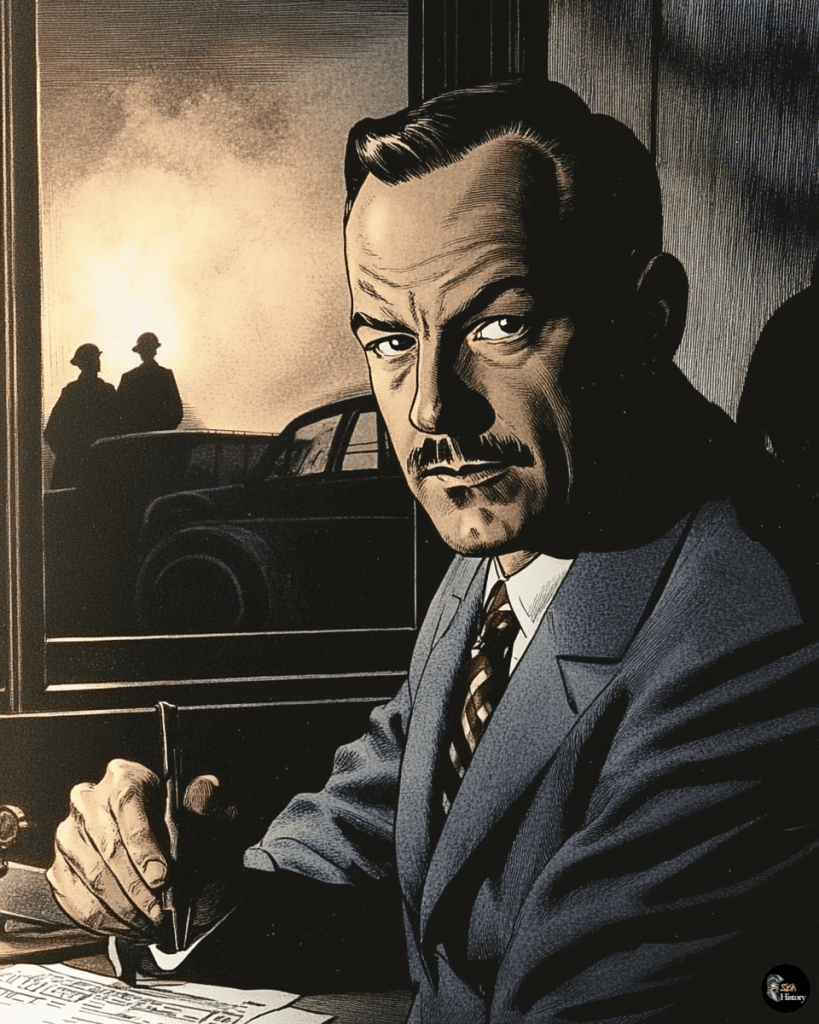Albert Göring’s story challenges our assumptions about the Nazi regime and the nature of resistance during World War II.
While his brother Hermann Göring was one of Hitler’s closest allies, Albert secretly worked to undermine the Nazi system and save Jewish lives.
His covert efforts to exploit his family name for humanitarian purposes shed light on the complex moral choices individuals faced in Nazi Germany.
Albert’s actions ranged from forging his brother’s signature on documents to free Jewish prisoners to warning potential arrest targets.
He used his position as export director at Škoda Works in Czechoslovakia to help many people escape Nazi persecution.
Despite sharing a last name with one of the most notorious Nazi leaders, Albert chose a path of moral courage and became an unsung hero of the Holocaust.
The contrast between the Göring brothers highlights the diverse responses to Nazi ideology within German society.
While Hermann rose to become Hitler’s second-in-command, Albert risked his life to protect the regime’s victims.
This lesser-known chapter of history reminds us that even in the darkest times, individuals can make choices that profoundly impact the lives of others.
The Göring Brothers and Nazi Resistance
The Göring brothers, Albert and Hermann, represent stark contrasts in their roles during World War II.
While Hermann was a key figure in the Nazi regime, Albert secretly worked against it, risking his life to save Jews and dissidents.
Albert Göring: Reluctant Hero
Albert Göring emerged as an anti-Nazi activist who used his family name to help hundreds of Jews and assist the Czech resistance.
Born on March 9, 1895, Albert’s life took a very different path from his infamous brother.
He despised the Nazi ideology and often used his influence to secure the release of prisoners from concentration camps.
Albert’s efforts included forging his brother’s signature on transit documents to help Jews escape Nazi-controlled territories.
Despite his heroic actions, Albert faced significant challenges after the war.
His surname became a burden, leading to difficulties in finding employment and social acceptance.
It wasn’t until decades later that his contributions began to receive proper recognition.
Hermann Göring: A Complex Villain
Hermann Göring, born January 12, 1893, rose to become one of the most powerful figures in Nazi Germany.
As head of the Luftwaffe and founder of the Gestapo, Hermann played a crucial role in the implementation of Nazi policies.
His actions during World War II led to immense suffering and loss of life.
Hermann was directly responsible for ordering numerous war crimes and played a significant part in the Holocaust.
Despite his brother’s activities, Hermann occasionally intervened on Albert’s behalf, demonstrating the complex nature of their relationship.
This familial connection likely protected Albert from severe consequences for his resistance efforts.
Navigating the Nazi Hierarchy
Albert Göring’s position as Hermann’s brother provided him with a unique opportunity to navigate the Nazi hierarchy.
He exploited his family connections to carry out rescue operations and sabotage Nazi efforts.
His tactics included using his brother’s name to requisition trucks, which he then used to smuggle dissidents and Jews to safety.
Albert also leveraged his position to place anti-Nazi individuals in key industrial roles, hampering the regime’s war efforts.
These covert operations required immense courage and strategic thinking.
Albert had to maintain a delicate balance, appearing loyal to the regime while secretly undermining it at every turn.
Wartime Dissidents and Covert Operations
Albert Göring’s resistance activities extended beyond individual rescues.
He actively supported Czech resistance movements and provided crucial information to underground networks.
His efforts included warning potential arrestees of impending Gestapo raids and facilitating the escape of political prisoners.
Albert’s actions saved countless lives and provided hope to those living under Nazi oppression.
Legacies of Courage
The story of Albert Göring stands as a testament to individual bravery in the face of overwhelming evil.
His actions during World War II exemplify the power of moral conviction and the impact one person can have, even within the darkest chapters of history.
Holocaust Rescue Efforts
Albert Göring’s resistance against the Nazi regime was marked by numerous covert operations to save Jewish lives.
He exploited his family name and connections to secure exit visas for Jews, often using his brother Hermann Göring’s official stationery to authorize their release from concentration camps.
Albert’s efforts extended to forging his brother’s signature on documents that would ensure safe passage for those at risk.
He also used his position as export director at the Skoda Works in Czechoslovakia to help many Jews and dissidents escape Nazi persecution.
Albert would arrange for trucks to enter the camps under the guise of collecting workers, only to drive them to safety once outside.
Aiding Jewish Refugees
Albert Göring’s commitment to aiding Jewish refugees went beyond merely facilitating their escape.
He provided financial support to many who fled, using his own resources and connections to ensure they could start new lives away from Nazi-controlled territories.
His network of helpers included resistance members, sympathetic officials, and even some of his brother’s subordinates who were quietly opposed to the regime.
In one daring instance, Albert helped Franz Lehar’s Jewish wife escape persecution by convincing Hermann to declare her an “honorary Aryan.” This act saved her life and demonstrated Albert’s willingness to leverage his familial ties for humanitarian purposes.
Unsung Heroes and Moral Courage
Albert Göring’s story is emblematic of the many unsung heroes who risked their lives during World War II to oppose Nazi atrocities.
His moral courage was particularly striking given his proximity to the highest echelons of Nazi power.
Despite the personal danger, Albert chose to act against the regime, embodying the spirit of resistance that existed even within Germany itself.
Other heroes who risked their lives to defy the Nazis included individuals like Oskar Schindler and Raoul Wallenberg.
These figures, like Albert, used their positions and resources to save as many lives as possible, often at great personal risk.
Historical Recognition and Hidden Histories
For many years, Albert Göring’s acts of heroism remained largely unknown. The weight of his family name overshadowed his humanitarian efforts in the immediate post-war period.
It wasn’t until decades later that historians began to uncover and verify the extent of his resistance activities.
The recognition of Albert Göring’s courage serves as a reminder that history is often more complex than it first appears. His story challenges preconceptions about guilt by association and highlights the importance of individual moral choices, even in the most dire circumstances.
Today, efforts continue to bring hidden histories like Albert’s to light, ensuring that the full spectrum of World War II experiences is understood and remembered.
These narratives enrich our understanding of the past and provide valuable lessons in human resilience and compassion.

